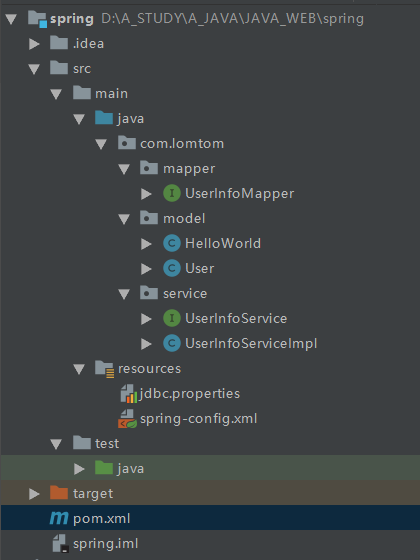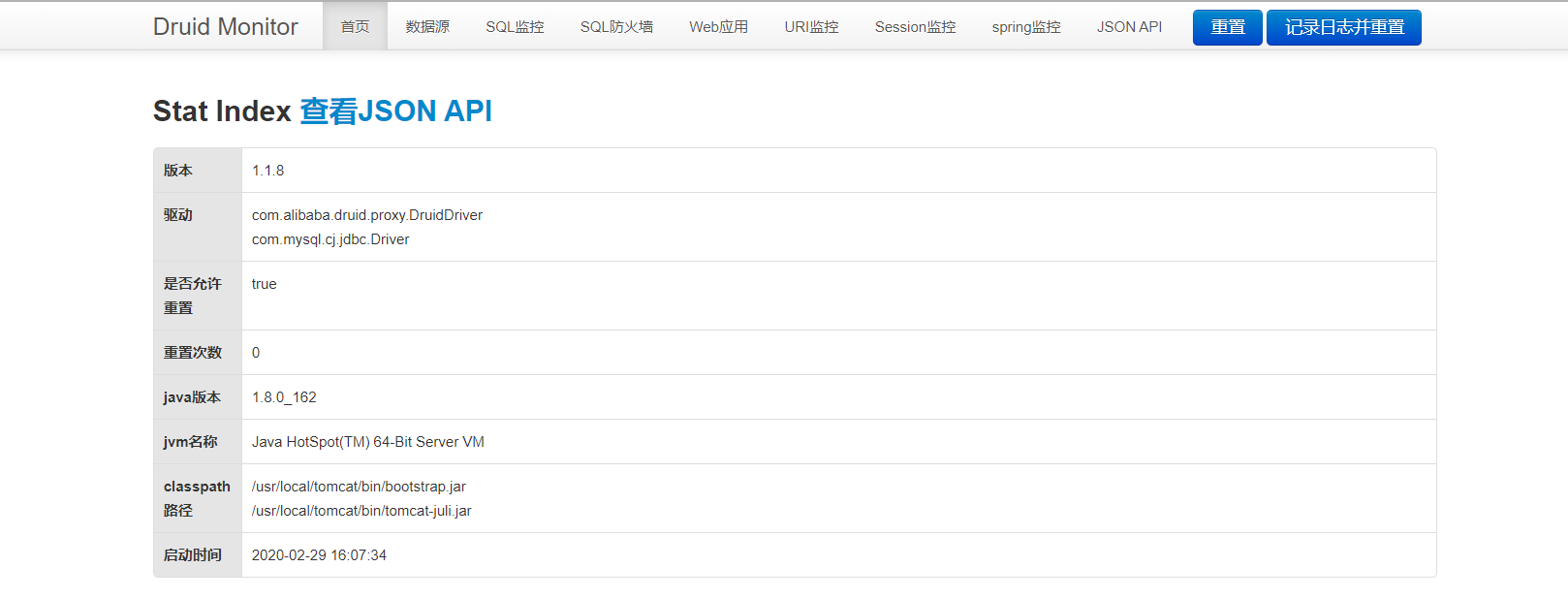【springboot spring mybatis】看我怎么将springboot与spring整合mybatis与druid数据源
- 3/19/2020

概述
本文分别讲述了spring与springboot是怎么整合mybatis与druid数据源的?如果你只是想实现其中一种,那你就不要把他们的配置过程搞混了。
1、mybatis
MyBatis 本是apache的一个开源项目iBatis, 2010年这个项目由apache software foundation 迁移到了google code,并且改名为MyBatis 。2013年11月迁移到Github。
MyBatis 是一款优秀的持久层框架,它支持定制化 SQL、存储过程以及高级映射。MyBatis 避免了几乎所有的 JDBC 代码和手动设置参数以及获取结果集。MyBatis 可以使用简单的 XML 或注解来配置和映射原生信息,将接口和 Java 的 POJOs(Plain Ordinary Java Object,普通的 Java对象)映射成数据库中的记录。
在国内以及韩国等地mybatis的普及率还是很高的。所以mybatis是绝对值得学习的。
2、druid
Druid提供了一个高效、功能强大、可扩展性好的数据库连接池,druid还有自己的数据访问监听系统,你的系统数据调用实时状况你都一通过druid来查看。
壹:spring整合
在整合mybatis之前,我们首先需要明确的是,我们需要哪些文件分别拿来干嘛的。
- 1、pom.xml — maven用于引入依赖的
- 2、jdbc.properties — 配置mybatis的数据源
- 3、mybatis-config.xml — 配置mybatis参数
一:文件结构
我们可以看淡我的整个的项目结构就是这样的,这里使用的是maven管理项目,直接建立maven项目即可,不懂maven的安装与配置的可以见我另一篇博文maven的安装与配置 🔗,配置好后,直接在新建项目里选择maven即可。
注:我的mybatis-config.xml直接就是放在spring-config.xml,归根到地,他们都是spring的配置文件,只是命名不同而已。

二:配置文件
1、pom.xml
pom.xml文件,有了这个文件之后,我们不需要像以前一样去找jar包,找到还不一定兼容,maven项目里,你直接在你的pom.xml文件里写相关依赖,他就会自动导入,jar包也会自动下载好,下面就是我们整合mybatis所需要的的相关依赖。
<!-- 数据库 start-->
<!-- 引入jdbc与mysql依赖-->
<!-- https://mvnrepository.com/artifact/org.springframework/spring-jdbc -->
<dependency>
<groupId>org.springframework</groupId>
<artifactId>spring-jdbc</artifactId>
<version>5.1.5.RELEASE</version>
</dependency>
<dependency>
<groupId>mysql</groupId>
<artifactId>mysql-connector-java</artifactId>
<version>5.0.8</version>
</dependency>
<!--引入druid数据源-->
<!-- https://mvnrepository.com/artifact/com.alibaba/druid -->
<dependency>
<groupId>com.alibaba</groupId>
<artifactId>druid</artifactId>
<version>1.1.8</version>
</dependency>
<!-- mybatis-->
<!-- https://mvnrepository.com/artifact/org.mybatis/mybatis -->
<dependency>
<groupId>org.mybatis</groupId>
<artifactId>mybatis</artifactId>
<version>3.4.6</version>
</dependency>
<!-- spring整合mybatis -->
<dependency>
<groupId>org.mybatis</groupId>
<artifactId>mybatis-spring</artifactId>
<version>1.3.0</version>
</dependency>
<!-- 数据库 end-->
2、jdbc.properties
这个文件主要用于存放我们mybatis连接的数据库参数,依次为驱动、url、用户名、密码参数,你只需要换成你自己的就好了,设置好之后,我们需要下一个配置文件来加载。
jdbc.driverClassName=com.mysql.jdbc.Driver
jdbc.url=jdbc:mysql://localhost:3306/world?characterEncoding=UTF-8
jdbc.username=root
jdbc.password=qwer1234
3、mybatis-config.xml
这时,你会疑问,咦,上面的文件结构图中没有这个文件啊?
我的mybatis-config.xml直接就是放在spring-config.xml,归根到地,他们都是spring的配置文件,只是命名不同而已。当然,也可以单独配置一个,只需要在启动的时候加载他就可以了。
整合druid数据源,就在这个文件里配置即可。
<!-- 这个是加载下面的mapper与service注入到容器中,这样你才能使用,注意你自己的包名-->
<context:annotation-config/>
<context:component-scan base-package="com.lomtom"/>
<!-- 配置 读取properties文件 jdbc.properties -->
<context:property-placeholder location="classpath:jdbc.properties" />
<!-- <bean id="propertyConfigurer" class="org.springframework.beans.factory.config.PropertyPlaceholderConfigurer">-->
<!-- <property name="location" value="classpath:jdbc.properties"/>-->
<!-- </bean>-->
<!-- 配置 数据源 整合druid-->
<bean id="dataSource" class="com.alibaba.druid.pool.DruidDataSource">
<property name="driverClassName" value="${jdbc.driverClassName}" />
<property name="url" value="${jdbc.url}" />
<property name="username" value="${jdbc.username}" />
<property name="password" value="${jdbc.password}" />
</bean>
<!-- spring和MyBatis完美整合,不需要mybatis的配置映射文件 -->
<bean id="sqlSessionFactory" class="org.mybatis.spring.SqlSessionFactoryBean">
<property name="dataSource" ref="dataSource"/>
<property name="mapperLocations" value="classpath:com/lomtom/mapper/*.java"/>
</bean>
<!-- DAO接口所在包名,Spring会自动查找其下的类 -->
<bean class="org.mybatis.spring.mapper.MapperScannerConfigurer">
<property name="basePackage" value="com.lomtom.mapper" />
<property name="sqlSessionFactoryBeanName" value="sqlSessionFactory"/>
</bean>
二:java代码
1、mapper
在mybatis里,支持两种写法,一种是注解版,一种是xml版,这里推荐使用注解版。
mybatis我使用的是注解版,注解版简单。如果使用xml版,需要配置maven的静态资源访问。
package com.lomtom.mapper;
import com.lomtom.model.User;
import org.apache.ibatis.annotations.*;
/**
* User: lomtom
* Date: 2020/3/2
* Time: 16:45
*/
@Mapper
public interface UserInfoMapper {
@Select("select * from user where username = #{username} and password = #{password}")
User login(@Param("username") String username,@Param("password") String password);
}
2、service
一般来说,我们为了规范,还是建一个service层。这里是实现service接口,你还需要自己写UserInfoService接口,加上login();函数即可,不是很难,就不板述了。
package com.lomtom.service;
import com.lomtom.mapper.UserInfoMapper;
import org.springframework.beans.factory.annotation.Autowired;
import org.springframework.stereotype.Service;
/**
* User: lomtom
* Date: 2020/3/2
* Time: 17:21
*/
@Service
public class UserInfoServiceImpl implements UserInfoService {
@Autowired
UserInfoMapper userInfoMapper;
@Override
public boolean login(String username, String password) {
return userInfoMapper.login(username, password) != null;
}
}
3、测试
我使用的是spring测试单元测试的,需要在pom.xml引入JUNIT依赖,当然,你也可以直接写一个main函数调用。
最后的结果就不展示了,他无非就是一句登陆成功,或者登陆失败。
import com.lomtom.model.HelloWorld;
import com.lomtom.service.UserInfoService;
import org.junit.Before;
import org.junit.Test;
import org.springframework.beans.factory.annotation.Autowired;
import org.springframework.context.ApplicationContext;
import org.springframework.context.support.ClassPathXmlApplicationContext;
/**
* User: lomtom
* Date: 2020/3/2
* Time: 19:45
*/
//测试类
public class test {
private ApplicationContext context;
@Before
public void setUp() throws Exception {
// 加载配置文件
context = new ClassPathXmlApplicationContext("spring-config.xml");
}
@Test
public void Test2(){
UserInfoService userInfoService = context.getBean(UserInfoService.class);
boolean flag = userInfoService.login("admin","123456");
if (flag){
System.out.println("登录成功。。。。");
}
else{
System.out.println("登陆失败。。。");
}
}
}
贰:springboot整合
相对于spring,springboot的整合就简单的多,因为在springboot里,很多都是自动配置的,相当于就是对spring的再一次封装,所以在springboot里,很多东西就变得简单很多。
相比spring,我们不需要配置麻烦的spring配置xml文件,只需要在application.yml文件中配置即可。当然,pom.xml时maven所需要的,所以他也是必不可少的。
建立项目的时候,选择spring initializr就可以快速建立一个springboot项目,当然如果你想自己配置,那我也是无法阻拦的。
1、pom.xml
springboot与spring引入mybatis所需依赖,是不同的,所以你最好还是复制这里的,这里我也是吸取了教训的。哈哈哈
<!-- 引入jdbc与mysql依赖-->
<dependency>
<groupId>org.springframework.boot</groupId>
<artifactId>spring-boot-starter-jdbc</artifactId>
</dependency>
<dependency>
<groupId>mysql</groupId>
<artifactId>mysql-connector-java</artifactId>
</dependency>
<!--引入druid数据源-->
<!-- https://mvnrepository.com/artifact/com.alibaba/druid -->
<dependency>
<groupId>com.alibaba</groupId>
<artifactId>druid</artifactId>
<version>1.1.8</version>
</dependency>
<!--日志打印-->
<dependency>
<groupId>log4j</groupId>
<artifactId>log4j</artifactId>
<version>1.2.17</version>
</dependency>
<!-- mybatis-->
<dependency>
<groupId>org.mybatis.spring.boot</groupId>
<artifactId>mybatis-spring-boot-starter</artifactId>
<version>1.3.1</version>
</dependency>
2、application.yml(resources下)
与spring不同的是,在springboot里,不需要建很多的配置文件,你所有的配置参数全部卸载这里面即可。
在springboot里面,配置文件有两种,一种是properties,另一种是yml,两种语法有点不同,不过都可以作为springboot的配置文件,
spring:
datasource:
username: root
password: qwer1234
url: jdbc:mysql://localhost:3306/world?serverTimezone=UTC&characterEncoding=utf-8
# 不写driver-class-name则自动分配
# driver-class-name: com.mysql.cj.jdbc.Driver
# 配置druid数据源
type: com.alibaba.druid.pool.DruidDataSource
mybatis:
#注解版与xml版不能共同使用
## 指定全局配置的路径(xml版配置)
# config-location: classpath::mybatis/mybatis-config.xml
## 指定sql映射文件的位置(xml版配置)
# mapper-locations: classpath:mybatis/mapper/*.xml
configuration:
# 开启驼峰命名法
map-underscore-to-camel-case: true
logging:
# 开启com.lomtom.blog.mapper包下所有的日志(在调用时)
level:
com.lomtom.myblog1.mapper: debug
3、druid配置
虽然说在springboot里面配置数据源,但是如果我们想要通过网页端访问的话,需要配置以下内容,我们就可以通过访问druid的来查看web的数据状态。
访问地址:http://localhost:8080/druid,然后输入账号密码就可以访问。
package com.lomtom.myblog1.config;
import com.alibaba.druid.pool.DruidDataSource;
import com.alibaba.druid.support.http.StatViewServlet;
import com.alibaba.druid.support.http.WebStatFilter;
import org.springframework.boot.context.properties.ConfigurationProperties;
import org.springframework.boot.web.servlet.FilterRegistrationBean;
import org.springframework.boot.web.servlet.ServletRegistrationBean;
import org.springframework.context.annotation.Bean;
import org.springframework.context.annotation.Configuration;
import javax.sql.DataSource;
import java.util.Arrays;
import java.util.HashMap;
import java.util.Map;
/**
* User: lomtom
* Date: 2020/1/4
* Time: 21:09
*/
@Configuration
public class DruidConfig {
@ConfigurationProperties(prefix = "spring.datasource")
@Bean
public DataSource druid(){
return new DruidDataSource();
}
//设置druid监控
//1、设置管理后台的servlet
@Bean
public ServletRegistrationBean statViewServlet(){
ServletRegistrationBean registrationBean = new ServletRegistrationBean(new StatViewServlet(), "/druid/*");
Map<String,String> initParams=new HashMap<>();
initParams.put("loginUsername","admin");
initParams.put("loginPassword","admin");
initParams.put("allow","");
// initParams.put("deny","");
registrationBean.setInitParameters(initParams);
return registrationBean;
}
//2、设置web的监控filter
@Bean
public FilterRegistrationBean webStatFilter(){
FilterRegistrationBean registrationBean = new FilterRegistrationBean();
registrationBean.setFilter(new WebStatFilter());
Map<String,String> initParams=new HashMap<>();
initParams.put("exclusion","*.js,*.css,/druid/*");
registrationBean.setInitParameters(initParams);
//添加过滤规则
registrationBean.setUrlPatterns(Arrays.asList("/*"));
return registrationBean;
}
}
访问http://localhost:端口名/druid

4、mapper
在spring里面,还要配置文件进行包扫面,而在springboot里面直接加@Mapper注解即可,springboot会自动注册的。然后直接调用即可。
import com.lomtom.myblog1.entity.User;
import org.apache.ibatis.annotations.*;
import java.util.List;
/**
* User: lomtom
* Date: 2020/1/30
* Time: 17:49
*/
/**
* 用户的mapper类
*/
@Mapper
public interface UserMapper {
@Select("select * from user where userName=#{username} or email=#{username}")
User getUserByUsername(String username);
}
5、测试
在spring boot里,在启动的时候不需要手动配置加载文件,所有的一切,他都会自动配置完成,你只管调用就可以了。
当然,最后的结果就不展示了,他无非就是一句登陆成功,或者登陆失败。
package com.lomtom.myblog1;
import com.lomtom.myblog1.mapper.UserMapper;
import org.junit.jupiter.api.Test;
import org.springframework.beans.factory.annotation.Autowired;
import org.springframework.boot.test.context.SpringBootTest;
@SpringBootTest
class Myblog1ApplicationTests {
@Autowired
UserMapper userMapper;
@Test
void contextLoads() {
boolean flag = userMapper.login("admin","123456");
if (flag){
System.out.println("登录成功。。。。");
}
else{
System.out.println("登陆失败。。。");
}
}
}
作者有话
本文主要介绍了spring与springboot分别怎么整合mybatis的,相信你看了之后,如果你还是初学者,那么问题是免不了的,但是谁不是这么过来的呢,你唯一能做的就是发现问题-找到问题-解决问题,当然,如果你在配置过程中有问题,笔者还是很乐意为你解答的。
而谈及spring与spring boot,spring boot就是spring的拓展,他主要消除了spring复杂繁多的xml配置文件,实现极大程度的自动化配置,所以看到我们在整合mybatis时,配置变得相当简单,当然,最为笔者的建议,你要是会spring boot,一定要明白他其中的自动配置原理,然后再去回顾spring时,你就会惊讶的发现,哦~,原来他是这样的。很多东西就会豁然开朗。
标题:【springboot spring mybatis】看我怎么将springboot与spring整合mybatis与druid数据源
作者:lomtom
链接:https://lomtom.cn/springboot-spring-mybatis看我怎么将springboot与spring整合mybatis与druid数据源

